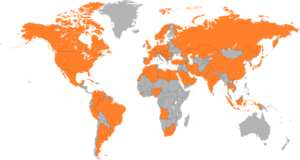World Petroleum Council (WPC) was established in 1933 to promote the management of the world’s petroleum resources for the benefit of mankind. Today, it is the premier global oil and gas forum and the only international organization to represent all aspects of the petroleum sector.
A non-political, Non-Governmental Organization accredited by the United Nations, the WPC aims to catalyze and facilitate dialogue on key technical, social, environmental and management issues, in order to seek solutions to these issues.
The global membership elects the President and an Executive Committee every three years to develop and execute the WPC’s strategy. The Council selects the host country for the World Petroleum Congress from the candidate countries and elects a Congress Programme Committee whose members are responsible for ensuring the scientific and topical quality of the event.
The WPC Secretariat is based in London, UK, under the leadership of the Director General and a dedicated team.
With 64 member countries, the WPC represents more than 95% of the world’s oil and gas production and consumption. Each member country has a National Committee represented in the Council, the governing body of the WPC, which convenes once a year.
WPC Member Countries

Algeria
Angola
Argentina
Austria
Azerbaijan
Bahrain
Belgium
Bosnia & Herzegovina
Brazil
Canada
China
Colombia
Croatia
Cuba
Czech Republic
Denmark
Egypt
France
Germany
Hungary
India
Indonesia
Iran
Israel
Japan
Kazakhstan
Korea
Kuwait
Libya
Macedonia
Mexico
Morocco
Netherlands
Nigeria
Norway
Oman
Pakistan
Peru
Poland
Romania
Russia
Saudi Arabia
Serbia
Sierra Leone
Slovak Republic
Slovenia
South Africa
Spain
Sudan
Suriname
Sweden
Switzerland
Thailand
Trinidad & Tobago
Turkey
United Arab Emirates
United Kingdom
Uruguay
USA
Venezuela
Vietnam
